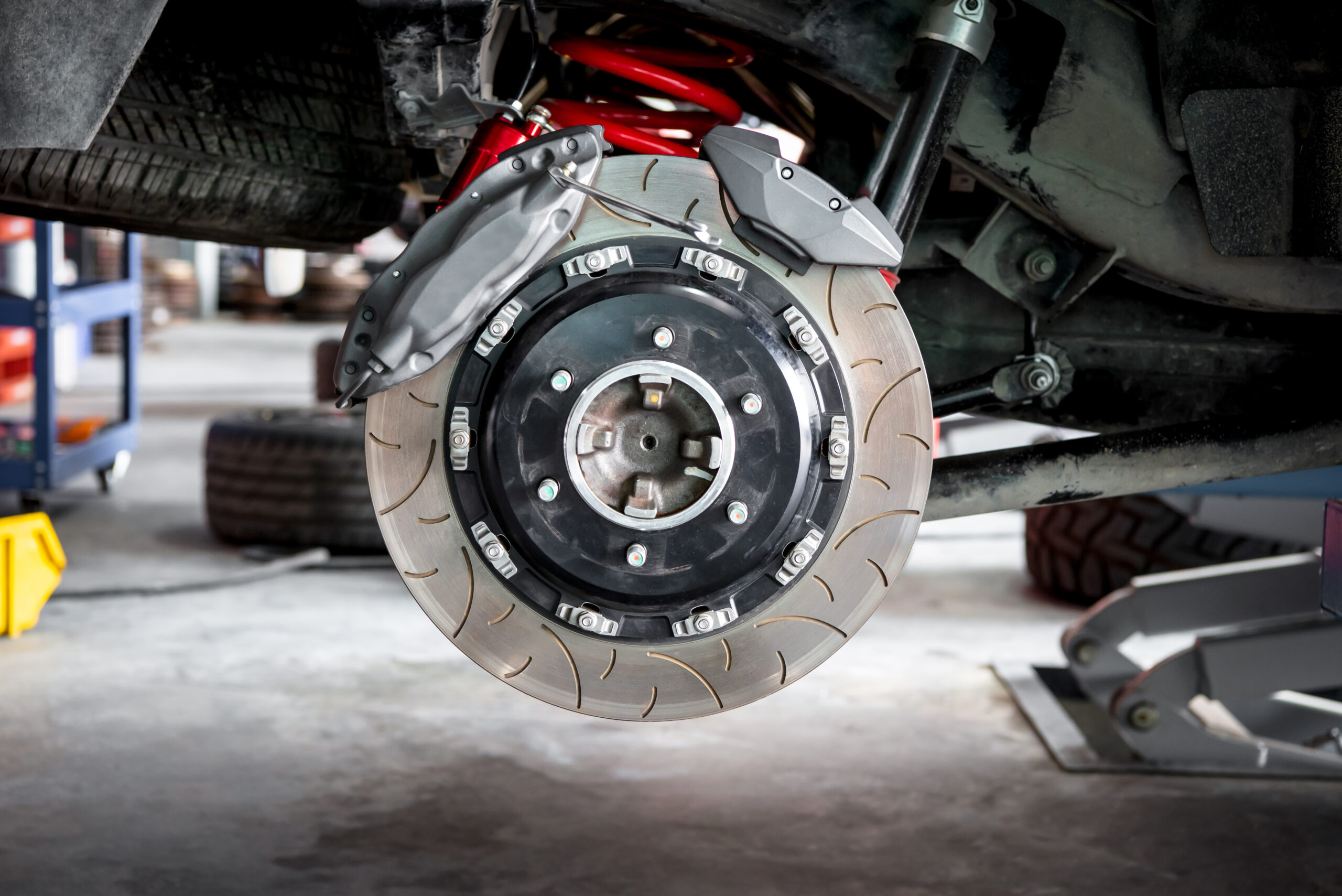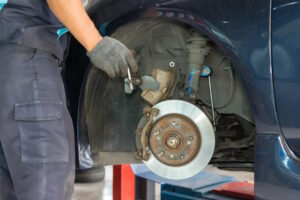Maintaining the braking system of your Ford Mustang is essential for driving safely. Brake problems can lead to serious safety issues, compromising your ability to stop effectively. Here, we’ll explore 11 common brake problems in Ford Mustangs that you should address promptly to keep your vehicle running smoothly and safely.
Squeaking or Squealing Brakes
 If you hear a high-pitched squeak or squeal when you press down on your Mustang’s brakes, it could be a sign that your brake pads are wearing thin. This sound often comes from a small metal piece called a wear indicator that contacts the brake rotor when the pad material is low.
If you hear a high-pitched squeak or squeal when you press down on your Mustang’s brakes, it could be a sign that your brake pads are wearing thin. This sound often comes from a small metal piece called a wear indicator that contacts the brake rotor when the pad material is low.
It acts as an early warning system, alerting you to the need for new brake pads. Addressing this issue early can prevent more severe damage to your braking system.
Damaged Brake Lines
Brake lines are essential for transferring brake fluid from the master cylinder to the calipers, enabling effective braking. Over time, these lines can suffer wear and tear, leading to leaks and reduced hydraulic pressure.
Damaged brake lines are often indicated by visible brake fluid leaks under the car or a soft brake pedal. This can significantly reduce braking efficiency and, in extreme cases, lead to brake failure. Regular inspection and maintenance of brake lines are crucial to prevent this dangerous issue.
Caliper Issues
Calipers are a critical component of your Mustang’s braking system, responsible for squeezing the brake pads against the rotors. When calipers malfunction, it can lead to uneven braking, increased stopping distances, and unusual noises.
A common caliper issue is seizing, where the caliper fails to move freely, causing the brake pads to constantly rub against the rotor. This not only wears down the pads prematurely but can also overheat the rotors. Addressing caliper problems promptly ensures balanced braking performance and prevents further damage to your braking system.
Grinding Noises
A grinding noise when applying your brakes is a serious indication that your brake pads are significantly worn down. This sound is caused by the metal backing of the pads rubbing directly against the metal brake rotors.
Not only does this reduce braking efficiency, but it can also damage the rotors. If you hear a grinding noise, it’s crucial to have your brakes inspected and repaired immediately to avoid further damage and ensure your safety.
Soft or Spongy Brake Pedal
A brake pedal that feels soft or spongy when pressed often signals a problem with the hydraulic components of your braking system. This issue could be due to air in the brake lines, a brake fluid leak, or problems with the master cylinder.
A soft pedal means less effective braking, which can be dangerous, especially in emergency situations. Regular checks of your brake fluid and system can help prevent this problem.
Hard Brake Pedal
 Conversely, a hard brake pedal can indicate a lack of boost from the brake booster. The brake booster helps make it easier to press the brake pedal and stop your vehicle. If it fails, it could be due to a vacuum leak, a faulty check valve, or issues with the booster itself.
Conversely, a hard brake pedal can indicate a lack of boost from the brake booster. The brake booster helps make it easier to press the brake pedal and stop your vehicle. If it fails, it could be due to a vacuum leak, a faulty check valve, or issues with the booster itself.
Without proper assistance from the brake booster, stopping your Mustang becomes more difficult, requiring more effort and potentially leading to delayed braking response.
Vehicle Pulls to One Side When Braking
When your Mustang pulls to one side during braking, it usually means that something is unbalanced in your brake system. A common cause is a stuck brake caliper, which can prevent even pressure distribution across all wheels.
Uneven brake pad wear or a faulty suspension component can also cause this issue. If your vehicle is pulling to one side, it’s important to have your brakes and related systems checked to ensure balanced braking performance.
Brake Warning Lights
Seeing a brake warning light on your dashboard indicates that there’s an issue with your braking system. The most common reason for this light is low brake fluid, which is essential for transferring the force from your foot on the pedal to the brakes on the wheels.
Low brake fluid levels can significantly impact braking performance and are often a sign of a leak in the system. It’s crucial to address this immediately to maintain your vehicle’s safety.
Reduced Stopping Power
Reduced stopping power is like running in water; it takes more effort and time to stop your car. This issue can be caused by worn brake pads, brake fade, or problems with brake fluid. Worn pads have less material to create the necessary friction for stopping.
Brake fade happens when the brakes overheat, often due to excessive use, and lose their effectiveness. Addressing these issues promptly ensures that your Mustang’s brakes function effectively when you need them most.
Brake Overheating or Brake Fade
Brake overheating occurs when the friction created by braking generates more heat than the system can dissipate. This can lead to brake fade, where the brakes become less responsive. Overheating can warp brake rotors, boil brake fluid, and cause other damage.
This is common in situations requiring frequent or intense braking, such as driving downhill or towing heavy loads. Ensuring your brakes are in good condition and using appropriate driving techniques can help prevent overheating.
Worn Brake Pads
Worn brake pads are one of the most common brake problems in Ford Mustangs. Over time, the friction material on the pads wears away, reducing their effectiveness. If they wear down too much, you might hear a screeching or squealing noise, signaling it’s time for a replacement.
Neglecting to replace worn pads can lead to metal-on-metal contact with the rotors, causing severe damage and higher repair costs.
Get High-Quality Mustang Brake Parts Today
Regular brake maintenance is crucial for the longevity and performance of your Ford Mustang. It helps catch issues like worn pads, low brake fluid, or damaged rotors before they escalate into more serious problems. Regular checkups can save you money in the long run by preventing costly repairs and ensuring that your vehicle remains safe to drive.
Top Flight Automotive emphasizes the importance of maintaining your Ford Mustang’s braking system. At TopFlightAutomotive.com, our extensive range of high-quality brake parts ensures that you’ll find everything you need to keep your vehicle safe and performing at its best.










Leave a Response